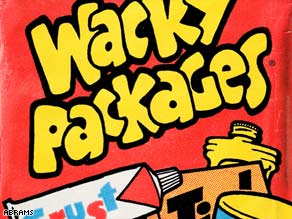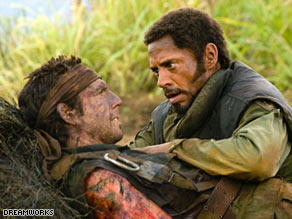CNN
(CNN) -- I blame Wacky Packages for making me the man I am today.

Though there have been attempts to bring them back, Wacky Packages' heyday was in the early '70s.
At 9 years old, I became hooked on the Topps-brand sticker series of product parodies, which recast Cap'n Crunch as "Cap'n Crud" and Nestle's Quik as "Nutlee's Quit" ("Explodes Instantly with Milk").
From there, it was a short trip to Mad magazine, "Saturday Night Live," National Lampoon, punk rock, trolling used-book stores and record stores, and indulging in other mind-rotting activities (memorizing trivia, creating puns) until I became the skeptical, disillusioned writer you have before you.
So, to Wacky Packages, I can only say: Thank you.
Not that Topps, or more specifically illustrator Art Spiegelman and writer Jay Lynch -- goaded by Topps' Woody Gelman and Len Brown -- knew the import of the work. In the preface to the new book "Wacky Packages" (Abrams), a collection of the first seven series of the Topps cards, Spiegelman -- yes, the same Art Spiegelman who won a Pulitzer Prize for "Maus" -- remembers the creation of Wackies as being "a dream job," but something that would probably be forgotten.
"It was all done as Part of a Day's Work, much like the way early comic books were made: they certainly weren't made as art, they weren't sold as art, and they weren't thought of as art," he says in the book's introduction. "Wacky Packages just formed an island of subversive underground culture in the surrounding sea of junk."
Lynch, a childhood friend of Spiegelman's who worked on Wacky Packages, Garbage Pail Kids and other Topps series, agrees.
"I didn't know they were that memorable until about 12 years ago, with the Internet," he says in an interview. (Several Web sites have been devoted to the cards, notably Greg Grant's Wacky Packages pages.) "Before that, I didn't think of it as any more important than the other series."


